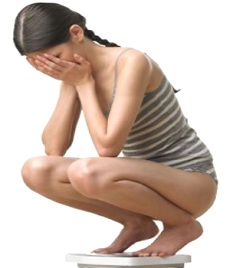 Imagine a life where you are continually tormented by an inner dialogue that screams of your worthlessness, your hideous appearance, and your pitiful, meaningless existence. Imagine a life where you mange your day solely around food, either by avoiding it, getting rid of it, or consuming as much of it as you can. Imagine spending your birthday in a psychiatric ward, perhaps too sick and too weak to even stand up on your own. And now imagine that there is a very strong part of you that wants to be worse. This is the horrible trap of an eating disorder.
Imagine a life where you are continually tormented by an inner dialogue that screams of your worthlessness, your hideous appearance, and your pitiful, meaningless existence. Imagine a life where you mange your day solely around food, either by avoiding it, getting rid of it, or consuming as much of it as you can. Imagine spending your birthday in a psychiatric ward, perhaps too sick and too weak to even stand up on your own. And now imagine that there is a very strong part of you that wants to be worse. This is the horrible trap of an eating disorder.
One of the most difficult aspects of eating disorder treatment is the mind-boggling fact that those suffering would often do almost anything to cling to their disease. As much as part of them wants to be happy and healthy and free from the constant torture, there is another part, often referred to as “the eating disorder self”, that convinces the sufferer that they will be nothing without it. When your eating disorder becomes your identity, medicals markers used to gauge its severity, such as amenorrhea (absence of menses in women), or the body mass index scale, are looked upon as levels of achievement. When you’re trapped in this mindset, worse really does seem better.
Throughout the years that I struggled with anorexia, I used the presence of my period as a way to prove to myself that I was still safe, that I still had weight to lose. Some individuals will stop menstruating fairly quickly after substantial weight loss, others, myself included, can maintain dangerously low weights yet continue to menstruate. I remember my therapist and my doctor both diagnosing me with anorexia nervosa, but I had seen and memorized what the Diagnostic and Statistical Manual of Mental Disorders said about anorexia. I had to lose my period to be “officially” classified. The diagnosis went in my charts nonetheless. Yet, I had this strange longing to fit the bill, to really be able to call myself anorexic, because it meant that at least I was doing something right. If I failed at everything else in life, at least I would master my eating disorder. I would be the best anorexic I could be.
I wanted to be the thinnest in the room, the sickest, and many times over I did hold that title. It became my prize, my sense of accomplishment. I became quite accustomed to the label “skinny, blonde girl.” Anorexia became my identity and when recovery (and the inevitable weight gain) threatened that, I would panic and slip right back into the disordered behaviors. Who would I be without it? I needed this disease to survive, or so my eating disorder constantly told me.
It is a very sick way of thinking, I know, but I also know that I was not alone in thinking. I have spent a great deal of time among other eating disordered individuals, and there is a definite cognitive pattern when it comes to symptoms and diagnostic labels. In short, it seems the worse you are, the better you feel. I can’t count how many times I’ve heard people with bulimia wish they had the “control” of their treatment peers with anorexia, and those who compulsively overeat long for the ability to easily purge like those with bulimia. There is an unfortunate perceived hierarchy among patients, with the “purity” and “cleanliness” of anorexia appearing to outrank the “hedonistic” behaviors of bulimia or compulsive eating. But in reality, they are all equally serious, and all deadly. Whether you’re starving or stuffing or purging, your eating disorder is a distraction, a desperate attempt to control the un-controllable.
Eating disorders, in general, are very control-focused. Whether it’s an attempt to control anxiety, or anger, or relationships, they trigger and feed off of the competitive and perfectionist personality traits that many sufferers share. I thought that if more control equaled more medical complications, so be it. But the crux of the matter is that sufferers inevitably reach a point, often quite quickly, where the lotus of control shifts completely out of their hands, and into the hands of the eating disorder.
It’s too hard to battle an eating disorder alone. Reaching out is the first step in successful recovery. Share your secret with a trusted friend or family member. Even that act of sharing a secret can often relieve some of the pain. Seek professional help. There are people who have been in your shoes and are willing to guide you out of the darkness. Hope is real. Recovery is real.

The preceding article was solely written by the author named above. Any views and opinions expressed are not necessarily shared by GoodTherapy.org. Questions or concerns about the preceding article can be directed to the author or posted as a comment below.



Please fill out all required fields to submit your message.
Invalid Email Address.
Please confirm that you are human.
Leave a Comment
By commenting you acknowledge acceptance of GoodTherapy.org's Terms and Conditions of Use.